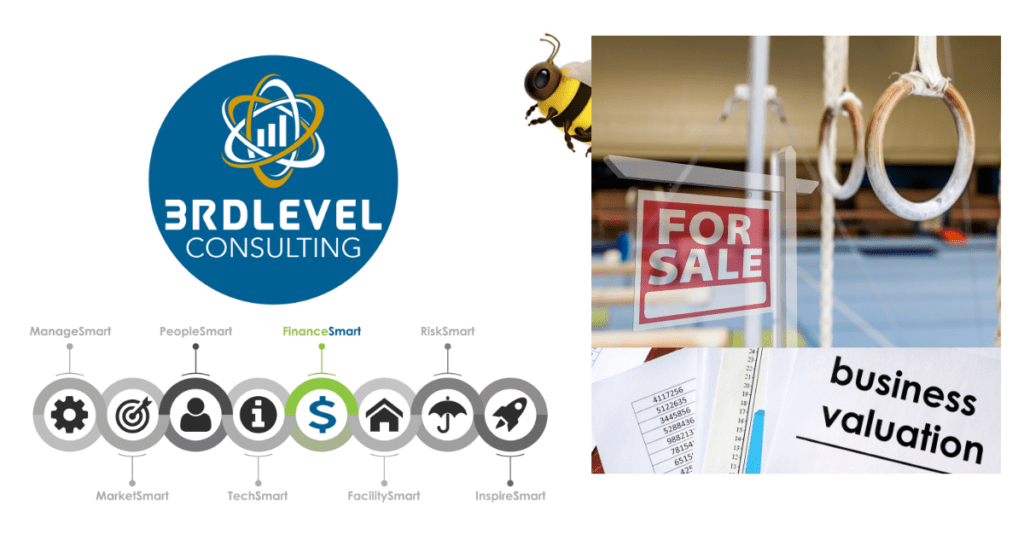Determining Value
Business value depends on many factors. For example: The demographics of your area can influence your success and business value. Do you know your demographics? 3rd Level’s Valuation and Business Brokerage division can provide you with a detailed demographics report that will provide answers to some of the questions below. Click here to request your demographic report.
- Does your community have enough actual and potential students for you and your competition? Is the area already saturated for your type of business?
- Is your community growing?
- Are you getting your fair share of the number of students available in your area? If not, what can you do to increase the number of clients? Expand programming? Improve customer experience? Marketing?
Why Should You Get a Business Valuation?
The most common reason is to sell your business. The most important reason is to know your net worth. Your business is an important part of your personal assets. All business owners should know the value of their business and track it over time.
Knowing your net worth and selling are not the only reasons, other important reasons include: Estate Planning, Succession or Exit Preparing, Planning a Business Loan/Expansion, Gifting Stock to Employees or Family Members, Death, Divorce and many more.
Common Valuation Mistakes
- Not using an industry specialist
- Not using multiple methods of valuation
- Not understanding the common valuation terms and definitions
- Not understanding the primary factors that impact value
You may not be ready to sell right now, but keep in mind that eventually an exit strategy will be a necessity.
Signs You Might be ready to sell:
- You are nearing Retirement Age
- You can Obtain Financial Security by Selling Now
- You Don’t have a Child or Employee Who can Replace You
- You Want to Do Something Else
- The Joy of Going to Work is Fading
- The Market is Right
Selling at the best price takes planning. By having a valuation, you know what your business is worth today, and you gain insight into how to make it worth more in the future. Ideally, start planning 3 or more years before the anticipated sale date. Do you need to start now? We are here to help, contact us, and we will get you started!
Increasing Business Value
Value – What a business is worth in a perfect world
Price – What a Buyer actually pays for a business
In the real world, the “price” may be more or less than the “value”. Many factors can affect the “Selling Price” of a business.
Some you can control and others you cannot.
Unfortunately, how hard and how many hours you have worked has no effect on value. However, several factors that increase value can be actioned before you sell.
Asset Terms
TANGIBLES are assets such as; your equipment, office supplies, vehicles, etc. INTANGIBLES are assets that aren’t necessarily something that you can “touch.” Goodwill is the value in excess of the physical equipment that is justified by many factors such as; student email list, profits, trained staff, managers, the business’ reputation, organizational systems, etc.
Ways to Increase Your Business Value
- Increase prices annually greater than inflation
- Grow your business / add more customers
- Increase revenue from existing customers
- Offer new services
- Expand by buying a competitor
- Plan ahead 3 – 5 years
Ways to Become More Informed about Impacts on Your Value
- Know and understand your financial reports
- Review and analyze your P&L (Profit/Loss) and income versus expenses
- Improve your organization and systems
- Educate yourself on business management
Things to Do Now (if you aren’t already)
- Delegate tasks below your pay rate. Do $100+ per hour work, not $15 per hour work!
- Document systems. If everything is in your head, the information leaves with you
- Build leaders that are potential future buyers
- Hire a Business Coach who knows your industry – a good business coach will create more income than you pay for the advice. Here at 3rd Level, we have several experienced business coaches who know all areas of Children’s Activity Center Businesses as they were all owners at one time. Memberships and on-demand consulting/coaching is available, contact us for more information.
Important Components of Value
Profits vs. Discretionary Earnings
Profits are the amount you pay taxes on. Discretionary Earnings (DE) are the total benefits you receive from your business. You want to maximize your income and minimize your expenses in the 3 years prior to the sale to show the most DE. Every dollar of DE can add $2 -$ 3 to the value of your business.
Think Profits – Profits – Profits!
Growth Trends
Growth trends can significantly affect business value and set the expectations for the future. When looking at 3 years of revenue and DE, what is the trend? Three years of revenue and profits should ideally show an upward trend.
Staff
The less dependent your business is on your skills, the higher the value of your business. You want to create a business that is as “turn-key” as possible. Making it easy for a buyer to step into your shoes increases the value and makes your business more appealing to buyers. Empowering your Management Team and having a detailed organizational chart will do just that. Small clubs that often cannot afford managers can still have well-trained, happy, committed and loyal staff.
Location
Leases are an often-overlooked area affecting value. SBA loans require a lease (or options) for the full length of the loan. Plan lease renewals (with proper wording and assistance from your attorney) well ahead of expiration. If you have the opportunity, always consider buying the building for your business.
Competition
By providing quality programs, you can obtain more than your “fair” share of available students in your area. Set your goals to always to have a higher ratio of students when compared to the demographics and size of your facility.
A “rule of thumb” is an easy to remember guideline that gives a ballpark value. Rules of Thumb are developed through experience with large amounts of data but could be totally wrong when applied in a specific situation.
An example “rule of thumb” for the value of sports instruction businesses is 0.65 x Gross Revenue. But… that rule would show 2 businesses with the same income as being worth the same value.
The “rule” does not take into consideration the expenses or that one could be losing a lot of money – while the second business may be very profitable.
These “rules” do not take other important influences into consideration
and can lead to significant over or under pricing a business.
Other Influences are covered in more detail in our webinar.
Some examples are shown here:
- Demographics
- Economy
- Number of Years in Business
- Product Diversification
Insights & Methodology
Fair Market Value
The IRS defines Fair market Value (FMV) as “the price at which property would change hands between a willing buyer and a willing seller when the former is not under compulsion to buy and the latter is not under compulsion to sell; both parties having reasonable knowledge of relevant facts.”
Depreciation
Equipment items may be fully depreciated to zero on a balance sheet but still have considerable value. Other equipment may have been purchased through the supply expense category and never have appeared on a balance sheet. Understand what equipment is included with the business and the FMV.
Discretionary Earnings (DE)
Discretionary Earnings (DE) are the total benefits you receive from your business. DE can be influenced by decisions you make and will reflect on your bottom line.
Valuation Approaches – The Income Approach, the Market Approach and The Asset Approach
Within these approaches, there are several methods. There are 8 commonly used methods to determine a fair price for a business. Using several methods gives confidence in the determined business value.
Important Components in Determining Your Asking Price
Discretionary Earnings (DE), “fair market value (FMV)” of all tangible assets, intangible assets, demographics and specific business risks are key components. These factors along with several others help to project future growth. A valuation can show the seller what can be done to improve the future sale price of the business. If you are ready to work with a one of our experienced professionals, to learn the value of your business click here.
Trends
- Use of multiple methods is now common
- Buyer understanding of “DE” has increased significantly
- Using valuations to set goals to achieve the sales price you hope to achieve
- Using a valuation for “What If” scenarios – i.e. What if I make $50,000 more in profits, how much will my business value increase?
Preparing to Sell
- Plan for Success – Work “on” your business not “in” your business. Achieving higher profits and a higher sales price takes planning and time.
- Determine Your Personal Goals – Are you still passionate about your business? How much longer do you want to be actively involved in running your business? Do you want to sell your business or hire someone to replace the duties you perform? How much will you need to sell your business for to accomplish your goal of retiring?
- Get a Valuation – A business valuation should be looked at as an investment in your future. In addition to learning the current value on your business, you will also learn and understand the factors that can increase your business value. Ask your valuation expert for feedback on profit targets so you can meet your goals.
- Have a Contingency Plan – Have an employee trained to perform your functions for the short term. Preserving the value of your business in a worst-case scenario is an important facet of planning. Seek advice from your professional team when creating your plan.
- Know Market Conditions – National and local economies can affect value and the number of potential buyers. Interest rates affect the amount of financing a buyer can get for a purchase loan.
- Hire Professionals – Do you have the time to become an expert in the Valuation & Business Brokerage process? Can you effectively negotiate the price without getting emotionally involved? Can you market your business and maintain confidentiality that your business is for sale? In most cases, a professional will save you time, money and frustration. We are here to help, click here to reach us now!
- Timelines – Recognize where you are as an owner and plan your transition timeline. Ideally, plan 3 or more years ahead of your projected sales date, especially if you want to make improvements to profitability and systems. If you have lost the passion for your business, renew your dedication to the business for the next 6 to 9 months, and list it today. If you are nearing retirement or getting ready to move on, remember that the on average a business takes 9 months from listing a business until closing.
Types of Sales
- Stock Sale – The buyer purchases the corporation with all of the known and unknown liabilities. Stock sales are rare but occasionally used in family or staff purchases. There is a Non-Taxable stock transfer, that larger businesses should consider if this little-known legal tax “loophole” is right for you (Only applies to corporations).
- Asset Sale – The most typical sale which involves the transfer of the Assets (Equipment) and the Intangibles (the rest of the business operations).
Special Consideration: Partnerships need a comprehensive written agreement that specifies how the value of the business will be determined. It is recommended that partners be compensated based upon the job duties and number of hours they work. Profits after paid work would be split based upon ownership.
Valuations are complicated!
Using a professional experienced in your industry is critical
to receive an accurate valuation and the maximum amount when selling.
Our “typical” sales process at 3rd Level includes 16 detailed steps so all important facets are covered. The saying “it takes a village” applies here as it does in many areas of our lives and businesses. Having a knowledgeable team by your side is critical. Your Attorney, Accountant, Business Consultant, Business Broker, Financial or Estate Planner and Spouse/Significant Other/Family are all part of your “village”. Make sure the professionals you hire protect you but understand that in order to close on your deal, a balanced contract that is fair to both sides is required.
Remember, Value is what a business is worth. Asking Price is how much the seller wants, and Sales Price is what a buyer actually pays for a business. In the real world, the buyer may be willing to overpay for strategic reasons or a seller could be tired, frustrated and just want out. The more successful and profitable a business is, the more likely a buyer’s and a seller’s opinions on price will meet. Getting the best price for your business involves preparation, knowing the value and working with an experienced team like 3rd Level to make your goals a reality. Contact us now for a confidential consultation.
Meet The Contributors
The contributors have successfully served children’s activity centers, gymnastics gyms, dance studios, cheer gyms and swim schools worldwide for 35+ years.



